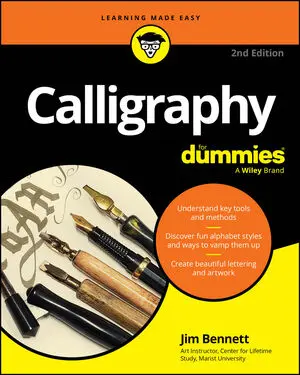After you've assembled your pen, but before you begin doing calligraphy, you must get the pen to write. A unique problem for fountain pens, you will likely encounter some ink-flow issues when writing, especially when using a new cartridge or pen. If you are using a cartridge pen, it's entirely normal for the pen to refuse to write immediately. The challenge is getting the ink out of the cartridge, down into the nib, and onto the paper.
Meet the ink-flow challenge by trying these techniques:
- Hold the pen loosely with the nib pointed downward about two inches above a sheet of scratch paper. Tap the nib lightly on the paper several times. Avoid jabbing the pen into the paper — just let it slide through your fingers of its own weight. The idea is to coax the ink to flow down into the nib.
- Hold the flat edge of the nib flush against the paper (don't hold it at an angle to the paper) and move the pen from side to side in straight lines so that the direction of the side-to-side movement is in line with the flat edge of the nib. The side-to-side stroke will help draw the ink down into the nib. This side-to-side technique is helpful for testing all pens. It not only helps get the ink to flow, but allows you to gauge the flow of the ink and get the "feel" of the pen. Practice this technique and adopt it as a standard way to test a pen prior to using it.
- Another technique you might try to get ink flowing is to apply a tiny bit of pressure against the paper as you draw the nib toward you. If you try this, be extremely careful that you don't press down too hard and bend the nib.
- If none of these methods work, here's an almost no-fail technique for getting a cartridge pen started: Just unscrew the barrel and give the cartridge a little squeeze until you see a small droplet of ink form at the back of the nib. Make sure you do this while you're holding the pen over a surface that won't be harmed if you squeeze a bit too hard and the drop of ink accidentally splatters onto whatever is underneath!
- If you're having problems with a fountain pen that you fill from a bottle, simply refill the pen. Refilling will saturate the nib with ink.
Once you get the pen working the first time, it should be easier to get it going the next time you use it. You definitely have to endure a "break-in" process. If you have trouble with your pen, treat it like a balky child: Be gentle and persistent and never lose your cool.
Sometimes a nib is particularly uncooperative (probably because there is an oily film on it). If you run into that situation, simply wipe the nib with ammonia. That should cure what ails it!





